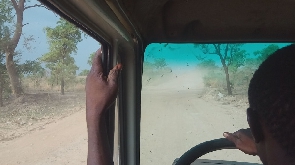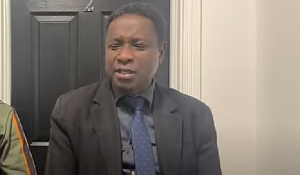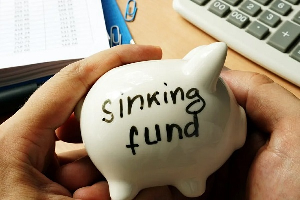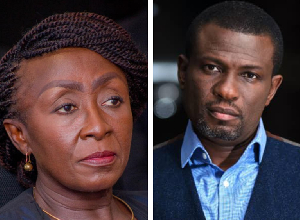Some time ago, a doctor showed a very disturbing picture of a lifeless woman to journalists at a news conference in Bolgatanga.
She had developed some serious complications during child delivery at Bawku and needed an emergency attention at the Upper East Regional Hospital in Bolgatanga.
She arrived at the hospital already dead. Doctors said she could have survived if she had reached the facility just minutes earlier. She was driven through the Bolgatanga-Bawku-Pulmakom Road. That is why she did not make it.
Owing to the bumpy surface of that highway, vehicles spend over three hours on a journey that should take about one and a half hours. In other words, the expectant mother could have stayed alive to welcome and nurse her newborn had the road been in good condition.
There is a swelling public outcry over the state of the road which did not start just yesterday. The outcry is as longstanding as the years which the presidents Ghana has had so far from the two foremost political parties in the country— the National Democratic Congress (NDC) and the New Patriotic Party (NPP)— have spent in office put together.
That international road needs a reconstruction attention government knows cannot wait. The potholes on the 116-kilometre-long highway outnumber the 206 bones in the human body and are so deep anguished road users describe them as “potwells”.
I have told people many times that if you admire blonde people and you want to be one, you need only to board any of the rickety minibuses plying that busy road at a Gh¢10 cost of transport. By the time the vehicle carrying you finishes taking you through the untarred portions of the road and disappearing and reappearing with you in the thick clouds of dust, all the hairs on your body, except those you have reserved in your armpits and those in the ‘sacred’ parts I do not want to mention, have turned gold and you are a blonde beauty. The quality or class of the blondeness is higher by a wide margin if you go through it on a motorbike. You would only be rubbing your eyes when you alight because the dust can be hot like alligator pepper or harsh like yazi— the spicy powder for barbecue.
We have a Bermuda Triangle along that road. It is at the diversion area. That is where the clouds of dust are so thick competing vehicles disappear and it is only by a divine intervention the vehicles hardly clash blind and head-on. And that is where armed bandits unleash terror and horror at night.
The trouble never goes away. In the rainy season, you would find vehicles trapped in the marshy parts of the highway like some isolated lumps of new yam stuck in a bowl of mpoto-mpoto (yam pottage) only waiting to be ‘forklifted’ away.
Traditional powers and state security commanders are now exhausted talking about the spate of armed robbery attacks continually experienced by drivers and passengers especially in the dead of night on the state-forsaken road.
The number of vehicles plying it is snowballing by the day. And, just as the disappearing edges of the stretch keep wearing away by the minute, the space is becoming too thin for the competing road users, particularly along Bawku, Zebilla and Zuarungu.
Whilst families are in tears for some lives maimed and claimed so far as a result of the appalling state of the highway, some drivers are also grieving over some vehicles which, for same reason, have gone kaput and are awaiting repairs in the region or emergency referrals to the Suame Magazine in the Ashanti region.
The King Weeps on the Road
Not too long ago, a very frustrated Paramount Chief of Bawku, Naba Asigri Abugrago Azoka II, whose traditional area covers six constituencies with over 200, 000 voters combined, asked government bewilderedly and with a tone of fury if his territory was part of Ghana.
The elderly monarch was at a complete loss at how, in spite of the enormous worth of the ECOWAS road to the state plus all the efforts he had made as a traditional figure to get it fixed without hesitation, government appeared to have turned its back on the Kusaug Kingdom. That was why he publicly asked in a Starr News interview in May, this year, if Bawku was part of Ghana or not.
It was only in July, 2016, five months to the general elections, the Mahama-steered Administration engaged Queiroz Galvão to reconstruct the road at a contract sum of Gh¢612 million. The Brazilian construction company immediately took its equipment to site and, following a beautiful sod-cutting ceremony at Lamboya in the Bawku West District, began a job scheduled to be completed in January, 2019.
We are told only about a quarter of the project, which was expected to have been completed within 910 days and commissioned 8 months ago, has been done so far. The delay is due to the contractor’s withdrawal from site over nonpayment of arrears on government’s part, with the current Akufo-Addo Regime being accused by an angry public of deliberately abandoning projects started by the previous government of John Mahama.
The suffering masses, including those enduring long journeys on ramshackle roads, have every right to descend on the same government who is not making available just parts of the arrears being demanded by the frustrated contractor to complete a Gh¢612-million (US$113,123,844) road reconstruction project but is devotedly talking about raising cash to put up a new parliamentary chamber (is it a priority?) that will cost an overwhelming US$200 million (Gh¢1,082,000,000) and zealously gathering funds for a national cathedral (is it a priority?) that will siphon off a rumoured US$100 million (Gh¢ 541,000,000) from the public purse to build.
When in opposition to power, the political parties talk avidly as if fixing the Bolgatanga-Bawku-Pulmakom Road is the first thing they would do when they are in position of power. But after they grab the ballot power, even the pace of an astronaut taking a maiden walk on the moon is speedier than the political will they show towards living up to that promise.
Mahama may be spared some amount of the blame. He, at least, showed some commitment by awarding the reconstruction project in 2016 and, whilst delivering an address to the sod-cutting ceremony crowd, said the contractor would have no excuse to finish the job behind schedule because funds had been made “fully” available for it.
"Let me assure you that the funding for the road is available and so any delay in the road work would not be due to funding. The funding is fully available and the work, I believe, once it starts would continue until it is completed,"Mahama affirmed in July, 2016.
Thursday, July 11, 2019, was exactly three years since he gave that assurance. The question anybody would ask is: where are the funds? Diverted or withheld?
A Discordant Orchestra
The perennial mention of this road in the State of the Nation Speech (SONS) and in the annual national budget with the usual promise to overhaul it but doing nothing as usual is not what baffles me. What baffles me is the open discord among government officials over it.
In 2016, Mahama said funds were fully available for the Bolgatanga-Bawku-Pulmakom Project. But the current Upper East Regional Minister, Paulina Patience Abayage, told Starr News in May, 2019, that the project stalled because the NPP government did not have funds for the project. The same highway was among the roads Ghanaians were told in the 2019 Budget Statement delivered by the Minister for Finance, Ken Ofori-Atta, in November, 2018, would be worked on. The Finance Minister announced in 2018 that Gh¢73.4 billion had been packaged for infrastructural projects, the Bolga-Bawku-Pulmakom Road included.
But, answering questions from Starr News on the stalled Bolgatanga-Bawku-Pulmakom Road in May, 2019, the Deputy Minister of Roads and Highways, Kwabena Owusu Aduomi, told the public government had cleared all arrears owed contractors. The Deputy Minister’s revelation suggested that Queiroz Galvão had been settled. We are in August; the contractor has not returned to site yet because, as we are told, the company has not been paid the arrears.
Did Mahama lie to Ghanaians that funds were fully available? Or he took some of the funds away after he lost his re-election bid in 2016? Did Ofori-Atta lie with the Gh¢73.4 billion meant for roads among some other projects when he presented his 2019 Budget Statement in November, last year, in Parliament? Is Queiroz Galvão’s refusal to return to site exposing the Deputy Minister for Roads and Highways who is suggesting the contractor has been paid?
Is the Upper East Regional Minister being honest by, contrary to what Mahama had said, and somewhat contrary to what the current Finance Minister and the Deputy Minister for Roads and Highways have told all of us, saying funds were not available whilst also hinting vaguely though that funds are still not available? Is this a case where a succeeding government, hiding behind endless assurances to quash public noise, just does not want to continue with a project started by a preceding government?
Fists of Fury
The masses using that ECOWAS-status road are getting more and more disillusioned. The tormenting state of the road has provoked enough open demonstrations and remonstrations.
I have seen fists of protest, punching the air in pictures across social media platforms in the region in a wave similar to the Sabela rhythm of the anti-apartheid rally in Soweto, with the hashtag “FixBolgaBawkuRoadNow”.
The agitation is not growing any less. It is getting worse with ‘fists of fury’ multiplying everywhere in their numbers.
Only some months ago, a group of residents served a strong public notice about a collective decision to block all government vehicles from using that road. That resolution was strongly anchored on a belief that government was unconcerned about the condition of the road simply because its officials, with strong-featured and air-conditioned vehicles at their disposal, did not feel the torture being endured by the ordinary driver or passenger on the low-cost or fragile vehicle plying it. If they feel it, they will fix it— the agitated residents believe.
The picture of the expectant mother who died from the appalling condition of the road, with streaks of child-delivery blood all over her lifeless body, is still grim in many hearts. Chiefs have lost their voices screaming for an urgent attention to get it fixed. Election watchers have said it— and I agree with them absolutely— that if there would be any threat to the 2020 polls, it would not be violence, but apathy!
Written and illustrated by Edward Adeti, an Investigative Journalist.
Opinions of Thursday, 8 August 2019
Columnist: Edward Adeti



















